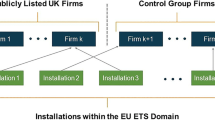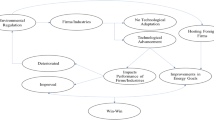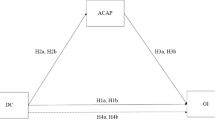Abstract
Flexible strategy of carbon tax is an important chip for the government to promote the implementation of carbon emission reduction. However, low-carbon technological innovation of enterprises is bound to produce market competition problems with traditional production technology. Based on this, in order to explore the relationship between heterogeneous objectives, carbon tax pricing strategy of government and decision-making of heterogeneous enterprise in the market, and how the government can make better use of carbon tax to promote the implementation of carbon emission reduction, this paper constructs and analyzes a three-stage dynamic game model between the government and heterogeneous enterprises. It is found that higher carbon tax pricing is not necessarily conducive to promote the implementation of carbon emission reduction. When the government's primary goal is to promote low-carbon technology innovative enterprise to increase innovative investment, the government should adopt the unified pricing strategy of carbon tax and improve carbon tax pricing; when the primary goal of the government is to promote the promotion of low-carbon products, the government should adopt the differentiated pricing strategy of carbon tax and reduce the carbon tax pricing of low-carbon technology innovative enterprise. In addition, this paper also studies the impact mechanism of different government pricing strategies on heterogeneous enterprise decision-making under heterogeneous objectives of government.




Similar content being viewed by others
References
Benjaafar S, Li YZ, Daskin M (2013) Carbon footprint and the management of supply chains: insights from simple models. Autom Sci Eng IEEE Trans 10(1):99–116
Bull J (2012) Loads of green washing-can behavioural economics increase willingness-to-pay for efficient washing machines in the UK? Energy Policy 50:242–252
Cao X, Fu JY (2017) Comparative analysis of effects of different carbon regulation policies on market competition between domestic-funded and foreign-funded companies. China Population, Resources and Environment 27(06):10–15
Cao BB, Xiao ZD, Zhu CY (2018) Research on decision-making of supply chain with dual sale mode considering government’s low-carbon policies. Chinese Journal of Management Science 26(4):30–40
Cheng YW, Mu D, Ma TT (2017) Optimal decision of carbon emission reduction in supply chain based on mixed carbon policy. J Syst Manag 26(05):947–956
Choi J, Bakshi BR, Hubacek K et al (2016) A sequential in-put-output framework to analyze the economic and environmental implications of energy policies: Gas taxes and fuel subsidies. Appl Energy 184:830–839
Deng WJ, Ma SH, Guan X (2017) Duopoly enterprises’ strategies for consumer environmental awareness under carbon-emission-trading mechanism. Chinese Journal of Management Science 25(12):17–26
Drake DF, Spinler S (2013) Sustainable operations managementan enduring stream or a passing fancy. Manuf Serv Oper Manag 15(4):13–49
Galinato GI, Yoder JK (2010) An integrated tax-subsidy policy for carbon emission reduction. Resour Energy Econ 32(3):310–326
Han B, Meng FS (2018) Analysis of external driving mechanism of low-carbon technology innovation of Chinese equipment manufacturing enterprise. Industrial Engineering and Management 23(03):42–49
He H, Ma CS, Wu ZH (2016) Pricing decision with green Technology input cap-and-trade policy. Chinese Journal of Management Science 24(05):74–84
IPCC (2007) Climate change 2007: Synthesis report. IPCC, Geneve, Switzerland
Kong Y, Wang YS, Jiao YJ et al (2021) Impact of government subsidies on the green innovation of new energy enterprises an analysis based on cournot competition. Inquiry Into Economic Issues 06:71–81
Lu C, Tong Q, Liu X (2010) The impacts of carbon tax and complementary policies on Chinese economy. Energy Policy 38(11):7278–7285
Lu BL, Zhang GT, Liu Y et al (2019) Nash game equilibrium model of the closed-loop supply chain network considering carbon tax mechanism and product green degree. China Population, Resources and Environment 29(01):59–69
Lv YW, Huo LN (2019) Analysis of coal enterprises’ low-carbon emissions reduction path based on evolutionary game. Journal of Systems Science 27(2):132–136
Pigou AC (1920) The economics of welfare. Macmillan, London
Samaras C, Apt J, Azevedo IL,2009. Cap and trade is not enough improving U.S. climate policy. Carnegie Mellon Engineering Carnegie Institute of Technology.
Shi MJ, Yuan YN, Zhou SL et al (2013) Carbon tax, cap-and-trade or mixed policy: Which is better for carbon mitigation? Journal of Management Sciences in China 16(9):9–19
Si BQ, Wen F (2021) Research on carbon policy choice of manufacturer under low carbon preference. Science and Technology Management Research 41(03):179–186
Su Y, Li GP (2021) Green technological innovation ability, product differentiation and enterprise competitiveness: Analysis of energy saving and environmental protection industry listed companies. Chinese Journal of Management Science 29(04):46–56
Tang SZ, Liu YZ, Xiao TJ (2020) Pricing and carbon emission reduction decisions in a socially responsible supply chain. Chinese Journal of Management Science 28(04):99–108
Tian H, Chen RL (2018) The impact of green product innovation on green competitive advantage of corporate. Science & Technology Progress and Policy 35(16):38–46
Vanclay JK, Shortiss J, Aulsebrook S et al (2011) Customer response to carbon labelling of groceries. J Consum Policy 34(1):153–160
Wang X, Tao CQ, Tang GJ (2014) Analysis of firms games under the influence of environmental constraints and factor agglomeration. J Manag 27(04):51–58
Wang MX, Bao Q, Tang L et al (2015) Enterprises' optimal abatement investment behavior with the carbon emission constraint. Journal of Management Sciences in China 18(6):41–57
Wu B, Liu PF, Xu XF (2017) An evolutionary analysis of low-carbon strategies based on the government-enterprise game in the complex network context. J Clean Prod 141(10):168–179
Xu JZ, Fu JW (2018) Research on carbon emission reduction of equipment manufacturing enterprises in the background of low carbon: the view of evolutionary game. Oper Res Manag Sci 27(5):40–48
Yang HX, Ou JW (2020) The effect of revenue sharing and bargaining power on carbon emission reduction in a supply chain. Systems Engineering - Theory & Practice 40(9):2379–2390
Yang LS, Zhu JP, Jia ZJ (2019) Influencing factors and current challenges of CO2 emission reduction in China: A perspective based on technological progress. Econ Res J 11:118–132
Yi M, Cheng XM (2018) Study on the green innovation strategy of enterprise from the perspective of carbon pricing policies. Software Science 32(07):74–78
Zhu QH, Xia XQ, Wang YL (2014) Study of the competition between low carbon products and ordinary products manufacturer based on government subsidies. J Syst Eng 29(05):640–651
Acknowledgement
We appreciated Pro. Wu S J for providing financial support.
Availability of data and materials
All data generated or analyzed during this study are included in this published article.
Funding
This study is supported by the Project funded by Shandong Natural Science Foundation (Grant numberZR2019MG030), the Project funded by Qingdao philosophy and social science planning (Grant numberQDSKL1801132).
Author information
Authors and Affiliations
Contributions
Xinchi Qu was involved in methodology, software, and formal analysis. Xiangyan Sun was involved in conceptualization and wrote the paper.
Corresponding author
Ethics declarations
Ethical approval
Not applicable.
Consent to participate
Not applicable.
Consent to Publish
The author confirms:
That the work described has not been published before;
That it is not under consideration for publication elsewhere;
That its publication has been approved by all co-authors;
That its publication has been approved by the responsible authorities at the institution where the work is carried out.
Competing interest
The authors declare that they have no known competing financial interests or personal relationships that could have appeared to influence the work reported in this paper.
Additional information
Responsible Editor: Nicholas Apergis
Publisher’s note
Springer Nature remains neutral with regard to jurisdictional claims in published maps and institutional affiliations.
Rights and permissions
About this article
Cite this article
Qu, X., Sun, X. How to improve the function of government carbon tax in promoting enterprise carbon emission reduction: from the perspective of three-stage dynamic game. Environ Sci Pollut Res 29, 31348–31362 (2022). https://doi.org/10.1007/s11356-021-18236-1
Received:
Accepted:
Published:
Issue Date:
DOI: https://doi.org/10.1007/s11356-021-18236-1




